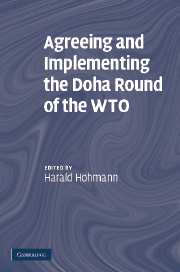Book contents
- Frontmatter
- Contents
- List of Contributors
- Foreword
- Introduction
- The future of the Doha Round
- PART ONE Development policy of the WTO
- PART TWO Trade policy (including competition) and trade facilitation
- PART THREE Reform of the dispute settlement system
- PART FOUR Social rights, health, and environment
- 15 Trade and human rights at work: Next round please …? Regulatory and cooperationist approaches in the context of the Doha Round
- 16 Food safety issues under WTO Agreements
- 17 Trade and the environment: With particular reference to climate change issues
- 18 Live with a quiet but uneasy status quo? An evolutionary role the appellate body can play in resolution of ‘trade and environment’ disputes
- 19 Health, environment and social standards in the Doha Round: Comparison of visions and reforms needed and the results achieved
- PART FIVE Conclusions
- Index
16 - Food safety issues under WTO Agreements
from PART FOUR - Social rights, health, and environment
Published online by Cambridge University Press: 23 February 2010
- Frontmatter
- Contents
- List of Contributors
- Foreword
- Introduction
- The future of the Doha Round
- PART ONE Development policy of the WTO
- PART TWO Trade policy (including competition) and trade facilitation
- PART THREE Reform of the dispute settlement system
- PART FOUR Social rights, health, and environment
- 15 Trade and human rights at work: Next round please …? Regulatory and cooperationist approaches in the context of the Doha Round
- 16 Food safety issues under WTO Agreements
- 17 Trade and the environment: With particular reference to climate change issues
- 18 Live with a quiet but uneasy status quo? An evolutionary role the appellate body can play in resolution of ‘trade and environment’ disputes
- 19 Health, environment and social standards in the Doha Round: Comparison of visions and reforms needed and the results achieved
- PART FIVE Conclusions
- Index
Summary
Relevant provisions of WTO Agreements relating to food safety issues
Overview of WTO Agreements relevant to food safety issues
Several Agreements in the WTO regime can be applied to food safety issues. The GATT 1994 generally prohibits quantitative restrictions of trade by way of import quota or any other form (Art. XI GATT) and the imposition of tariffs above the concession rate (Art. II GATT). It also prohibits Members from imposing a measure favoring its own products in discrimination of products of another Members if those products are “like products” (especially Art. III, para. 4 GATT). This principle is called the national treatment principle. A Member is prohibited from imposing a measure which favors a product of another Member in discrimination of products of third Members if those products are like products. This principle is called the most-favored-nation treatment (Art. I GATT). A state may engage in restrictions of import of foods for food safety reasons and, if that state is a Member of the WTO, this creates a tension between this measure and the above provisions of the GATT. However, Article XX of the GATT 1994 provides certain exceptions from the above prohibitions even if a measure falls under one of such prohibitions provided that the requirements of Article XX are satisfied. Therefore, as regards the GATT 1994, a critical question is to decide the conditions under which a measure which restricts trade but is designed to protect food safety is exempt from the disciplines of the GATT 1994.
- Type
- Chapter
- Information
- Agreeing and Implementing the Doha Round of the WTO , pp. 374 - 390Publisher: Cambridge University PressPrint publication year: 2008



